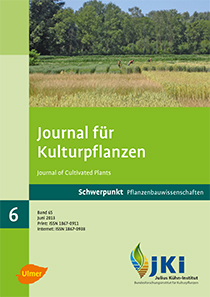Eco-stability of winter rye varieties under site conditions of Brandenburg
Keywords:
Eco-stability, eco-valence, floating checks, eco-regression, climatic water balanceAbstract
The main questions addressed by the present study were: Provide hybrid varieties as compared to other variety types in addition to a higher yield also an improved eco-stability, especially under dry weather conditions? Which differences in eco-stability between varieties of winter rye can be found?
To answer the question results from variety trials at multiple environments of Federal State Brandenburg were used and different varieties of winter rye were analyzed according to several bio-statistical parameters. The evaluation of eco-stability and yield capacity included following parameters: Eco-valence, eco-regression and floating checks. Additionally, different impact factors on variability of yield were estimated and the reaction of varieties to different weather conditions was analyzed based on the climatic water balance. Finally a brief review of the used methods and parameters is given.
The results of the different tests showed that the yield performance is determined by different environmental factors and by variety. The factor environment (site × year), which includes soil and weather throughout the course of the year, had the strongest influence on the variability of yield. The factor variety was comparatively less influential, but in special environments it can have an important influence on grain yield. There are also considerable differences between varieties with regard to the criteria eco-stability, yield capacity and their response to differentiated environmental conditions. The hybrid varieties compared to other variety types were considerably higher in yield and in tendency more stable in yield, especially also under dry weather conditions.
The evaluation results are important for plant breeding as well as for the choice of site-adapted varieties in agricultural practice. They offer information to environment dependent properties of varieties and can support variety selection in breeding and official variety recommendation by using an optimized evaluation scheme.
Downloads
Published
Issue
Section
License
The content of the journal is licensed under the Creative Commons Attribution 4.0 License. Any user is free to share and adapt (remix, transform, build upon) the content as long as the original publication is attributed (authors, title, year, journal, issue, pages).
The copyright of the published work remains with the authors. The authors grant the Journal of Cultivated Plants, the Julius Kühn-Institut and the OpenAgrar repository the non-exclusive right to distribute and exploit the work.







